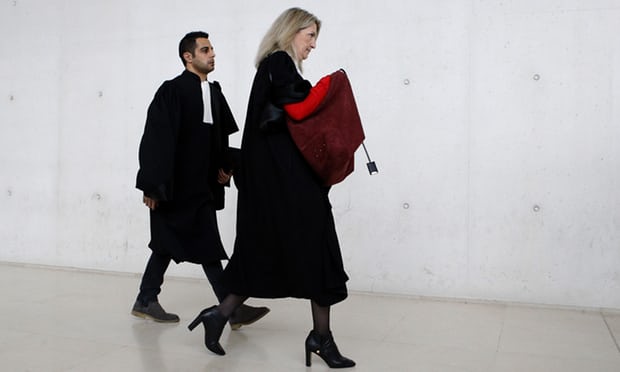French Girl, 11, "Not a Child" Say Lawyers for Man, 29, Accused of Sexual Abuse
Associated Press
A 29-year-old French man went on trial on Tuesday in a Paris suburb accused of sexually abusing 11-year-old girl in a case that has rekindled debate about France’s age of consent. France does not have a legal age under which a minor cannot agree to a sexual relationship – although the country’s top court has ruled that children aged five and under cannot consent. Lawyers for the suspect argued that the girl was consenting and aware of what she was doing, while lawyers for the girl have said she was simply too young and confused to resist. In a decision that shocked many, the prosecutor’s office in the town of Pontoise decided to put the man on trial not for rape but on charges of “sexual abuse of a minor under 15”. Defence lawyers say the man and the girl had met in a park and the girl had voluntarily followed him to an apartment and consented to intercourse. They have also said their client, then 28, thought she was at least 16. The girl’s family filed a complaint of rape in the town of Montmagny but prosecutors apparently felt the suspect did not use violence or coercion. French law defines rape as sexual penetration committed “by violence, coercion, threat or surprise”. “She was 11 years and 10 months old, so nearly 12 years old,” the defence lawyer Marc Goudarzian said Tuesday. “It changes the story. So she is not a child.” His colleague Sandrine Parise-Heideiger went further, saying: “We are not dealing with a sexual predator on a poor little faultless goose.” She said as soon as children have “sexual expressiveness and you have an attitude of putting yourself in danger” then “it doesn’t necessarily mean the person on the other side is a sexual predator”. Children’s rights groups and a psychiatrist testifying in the case argued otherwise. Carine Diebolt, the lawyer for the family, asked the court on Tuesday to change the charge to rape. The suspect “knew very well she was a young child”, said Armelle Le Bigot Macaux, president of the COFRADE, an umbrella group for children’s rights. “This young child isn’t protected today by our French society.” If convicted of sexual abuse, the suspect – a father of two – faces up to five years in prison. The rape of a minor under 15 is punishable by up to 20 years in jail. The presiding judge said the prosecutor had chosen the wrong charge and ordered the case to be sent back to investigators for a thorough investigation. As a result, the trial was postponed. “It’s a victory,” Diebolt told reporters after the trial. “The main thing is that [the girl] can at last be heard as a victim of rape … we can say it’s a victory for the victims.” Goudarzian, the defence lawyer, said the court’s decision was a result of the wide publicity given to the case. The Montmagny case is one of several that have prompted an uproar over France’s rules on child sex abusers, which are considered too lax by child rights groups and feminists. President Emmanuel Macron’s government has proposed a bill to introduce a minimum legal age for sexual consent. It would include a provision saying that intercourse with children under a certain age is by definition coercive. The proposed minimum age has not yet been decided on, but the cutoff could be between 13 and 15. The bill, a broad-based measure aimed at fighting “sexual and sexist violence”, is expected to be presented to the cabinet next month. A similar case . In November a French criminal court in November acquitted a 30-year-old man accused of raping an 11-year-old girl in 2009. The jury in the Paris region of Seine-et-Marne found he had not used violence or coercion. Since you’re here … … we have a small favour to ask. More people are reading the Guardian than ever but advertising revenues across the media are falling fast. And unlike many news organisations, we haven’t put up a paywall – we want to keep our journalism as open as we can. So you can see why we need to ask for your help. The Guardian’s independent, investigative journalism takes a lot of time, money and hard work to produce. But we do it because we believe our perspective matters – because it might well be your perspective, too. I appreciate there not being a paywall: it is more democratic for the media to be available for all and not a commodity to be purchased by a few. I’m happy to make a contribution so others with less means still have access to information. Thomasine F-R. If everyone who reads our reporting, who likes it, helps fund it, our future would be much more secure. For as little as ?1, you can support the Guardian – and it only takes a minute. Thank you.
|
.
Any original material on these pages is copyright © BishopAccountability.org 2004. Reproduce freely with attribution.
